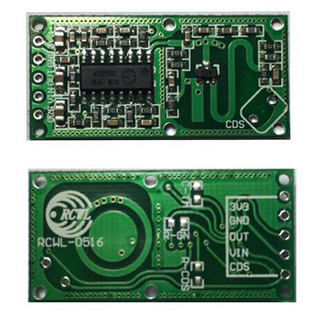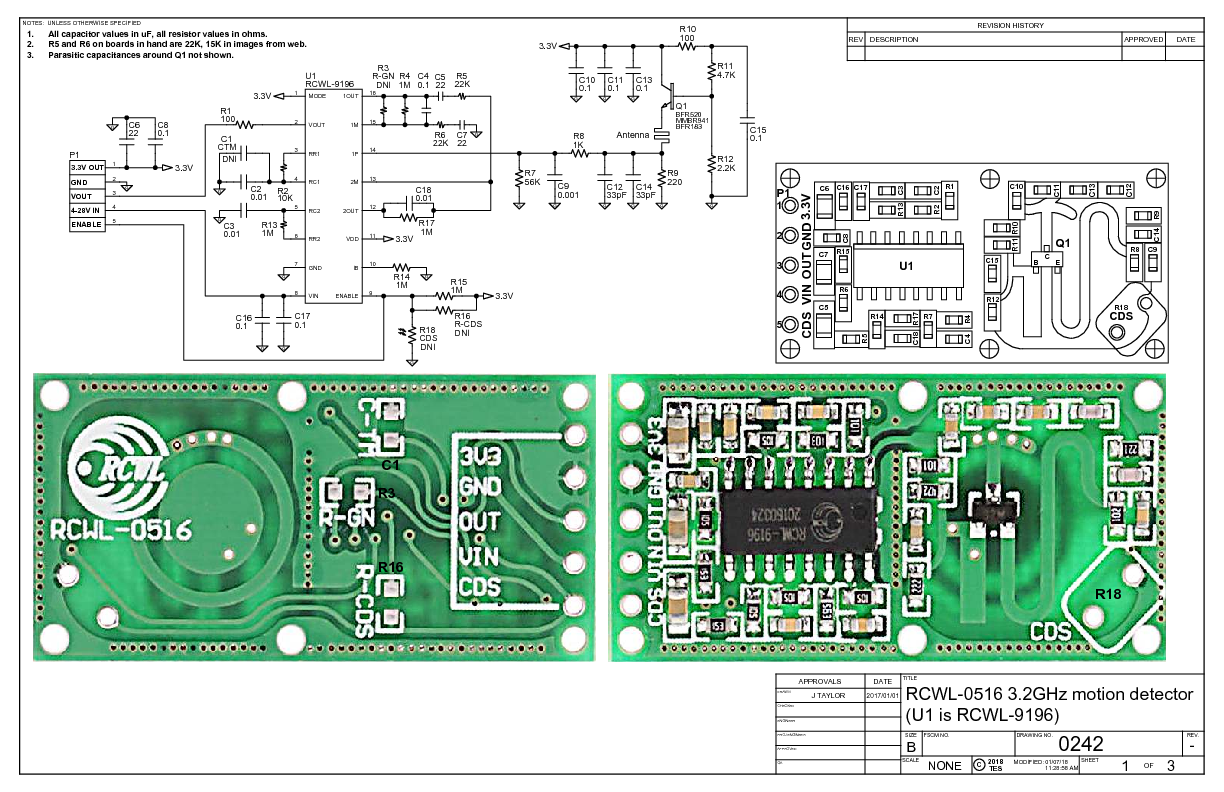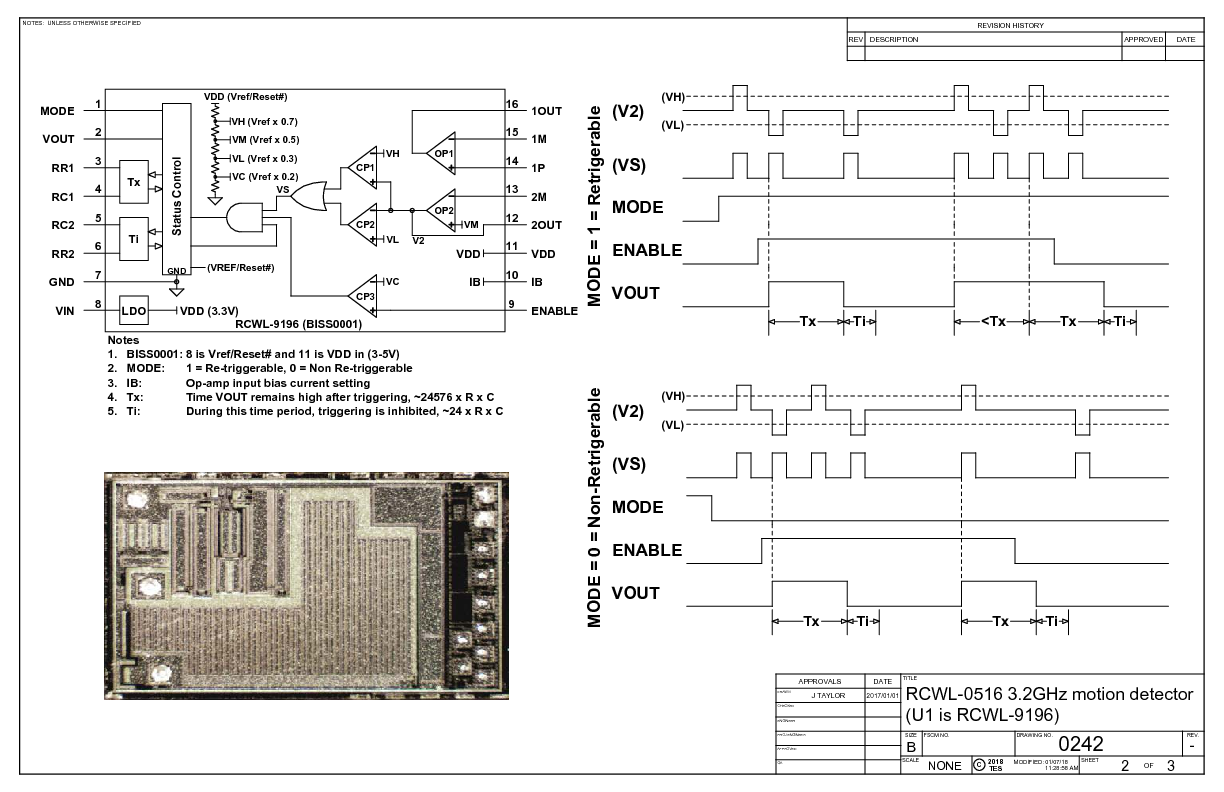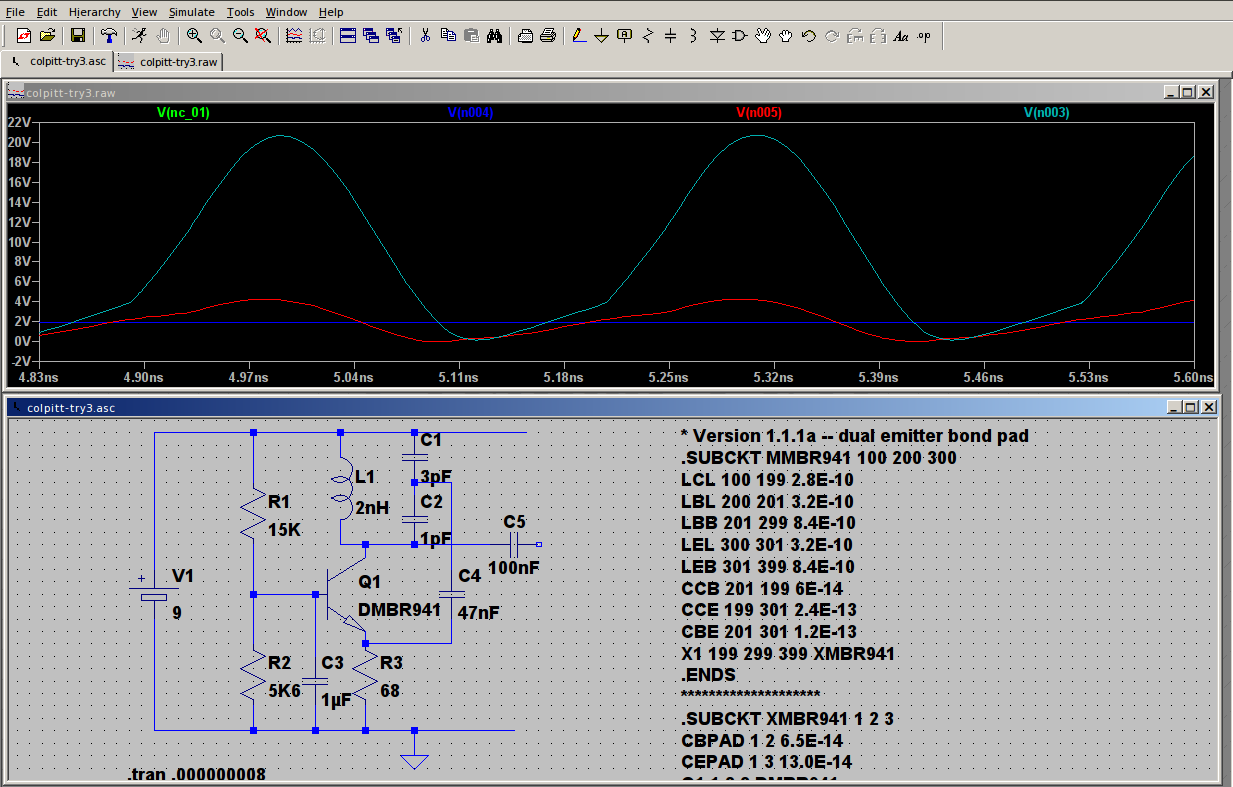There is a lively discussion on the project issue tracker. So make sure you check it out. If anyone wants to help keeping this main page updated let me know.
RCWL-0516 is a doppler radar microwave motion sensor module which can act as an alternative to a PIR motion sensor. This git repository is an attempt to collect the rather scant information on this board in one place.
The unit I have was supplied by IC station (SKU 10630): http://www.icstation.com/rcwl-0516-microwave-motion-sensor-module-radar-sensor-body-induction-module-100ma-p-10630.html (Use coupon code 'joeics' for a 15% discount).
Operating frequency: The product specification omits the operating frequncy. I found a carrier at 3.181GHz on my unit using a HackRF One SDR radio (see spectrum plot below). I suspect this frequency will vary from device to device: it would be difficult to have a tight specification with such a simple RF circuit on FR4 PCB.
Working voltage: 4 - 28V. It provides a convenient 3.3V output to drive a MCU (good for 100mA ?).
The forward side of the board is the side with components. This side should face the objects being detected. Do not obstruct forward side with anything metalic. The back side should have clearance of more than 1cm from any metal.
The board has the option to attach a cadmium disulphide ("CDS" on the board) light dependent resistor to disable the output when it is light, for when the board is used to control lighting. Pin 9 is pulled up (=output enable) by a 1M resistor. Attaching the optional CDS LDR will pull pin 9 down (=output disable) when it is light (i.e. the LDR's resistance drops below ~269k assuming no resistor R-CDS installed). R-CDS allows you to add a resistance in parallel with the onboard 1M pullup to adjust the light level at which pin 9 is pulled <0.7V. See below for equation for choosing RCDS value.
| Pin | Function |
|---|---|
| 3V3 | 3.3V regulated output. Max 100mA (?) |
| GND | Ground |
| OUT | Trigger: high (3.3V) if motion detected. 0V normally. |
| VIN | 4 - 28V supply voltage |
| CDS | LDR 10-20k RL, U_LDR > 0.7V = On |
Schematics contributed by John Taylor. Original PDF file here.
There are two parts to this circuit: 1. A microwave frequency transmitter/receiver/mixer and 2.a much lower frequency part based on an IC (marked RCWL-9196) which is very similar to the BISS0001 IC used in PIR motion detectors.
First the microwave part:
The best explanation of how the microwave part of this works is in patent EP3091605A1. It describes as similar type of module operating at 5.8GHz.
At the heart of the RF is a Q1 a MMBR941M high frequency NPN transistor [5] in what is probably a Colpitt oscillator [6] configuration. The schematic above is misleading because it omits a key inductor and capacitors constructed from PCB traces (a microline inductor and capacitor). The inductor is the S curve trace on the top surface and capacitors are the ring structure on the bottom surface and also the rectangular block to the left of the S curve. Using the formula at reference [12] below I calculte the inductance of the S curve to be (very approximately) 10nH.
A critical function of a doppler radar is to be able to 'mix' the reflected signal with the transmitted signal to arrive at a frequency which is the difference between the transmitted and reflected signal. In this board Q1 also cleverly assumes the function of the mixer: [TODO: this really needs to be explained].
The low doppler frequency difference is extracted by a low pass RC filter (C9 = 1nF, R3 = 1k, fc = 1/2πRC ≈ 160kHz) and amplified by the RCWL-9196 IC and treated exactly the same as a signal from a PIR sensor.
Update 4 Jan 2017: finally found the signal at 3.181GHz with the HackRF One SDR! One interesting observation: waving my hand in front of the sensor causes significant changes in the transmitting frequency, shifting by up to 1MHz. My theory: the low frequency doppler shift causes small changes in the transistor base bias. I used spice simulations to verify that small changes to transistor base bias causes changes in oscillation frequency. By running a few simulations I estimate that 1µV change in bias will change oscillation frequncy by 1.4MHz.
The low frequncy part
The core of the low frequncy signal processing is an IC marked RCWL-9196. The schematic says (in chinese) that it's similar to a BISS0001 PIR IC. But there are differences. Unfortunately I can't find any hard information (eg datasheet) on this. Nor can I find any information on the brand/company name "RCWL".
| Pin number | BISS0001 | RCWL-9196 |
|---|---|---|
| 1 | A Retriggerable & non-retriggerable mode select (A=1 : re-triggerable) | same |
| 2 | VO Detector output pin (active high) | same |
| 3 | RR1 Output pulse width control (Tx) | same? |
| 4 | RC1 Output pulse width control (Tx) | same? |
| 5 | RC2 Trigger inhibit control (Ti) | same? |
| 6 | RR2 Trigger inhibit control (Ti) | same? |
| 7 | Vss Ground | same |
| 8 | VRF RESET & voltage reference input (Normally high. Low=reset) | Vin (4 - 28V) |
| 9 | VC Trigger disable input (VC > 0.2Vdd=enable; Vc < 0.2Vdd =disabled) | same |
| 10 | IB Op-amp input bias current setting | ? |
| 11 | Vdd Supply voltage | 3.3V regulated output (100mA max?) |
| 12 | 2OUT 2nd stage Op-amp output | same |
| 13 | 2IN- 2nd stage Op-amp inverting input | same |
| 14 | 1IN+ 1st stage Op-amp non-inverting input | same |
| 15 | 1IN- 1st stage Op-amp inverting input | same |
| 16 | 1OUT 1st stage Op-amp output | same |
On the back of the board (the side without components) are pads for 3 optional components (0805 dimensions).
| Pad | Function |
|---|---|
| C-TM | Regulate the repeat trigger time. The default (unpopulated) time is 2s. A SMD capacitor to extend the repeat trigger time. Pin 3 of the IC emits a frequency (f), and the tigger time in seconds is given by (1/f) * 32678 |
| R-GN | The default detection range is 7m, adding a 1M resistor reduces it to 5m |
| R-CDS | Resistor in parallel with the 1M pullup. Without R-CDS, the lowest resistance of the LDR (i.e. highest light level) where the output is enabled is ~269kΩ (=0.7V on pin 9). Adding resistance here decreases the LDR resistance of the enable/disable threshold. If the LDR resistance at the desired light level threshold is <269k then you could add an external resistor in series with the LDR. Spreadsheet for calculating R-CDS or series resistor value based on LDR resistance at light level threshold. |
I started with an example Colpitt circuit [9] and substituted the 2N3904 NPN with a MMBR941 (Spice model from [10]). I am using the Windows LTSpice from Linear Technologies (available as free download [11], also works with Linux under Wine emulator). See colpitt.asc for a working Colpitt oscillator and rcwl-0516.asc for a model of the RCWL-0516 (however it does not oscillate!).
[TODO]
If ft is the transmitted frequency, fr is the reflected frequency (as measured by the common transmit/receive antenna on the sensor), v is the speed of the target relative to the sensor (negative if receeding, positive if advancing toward sensor), c is the speed of light and fd = (fr-fd) is the doppler shift, then:
fr = ft (c + v) / (c - v)
fd = fr - ft = 2v ft / (c - v)
If ( c << v) then fd ≈ 2v ft / c
Assume typical human motion speed of v = 1 m/s. ft = 3.181GHz, c = 2.998E8 m/s, then fd = 10Hz.
[1] http://wiki.seeedstudio.com/images/2/2f/Twig_-_BISS0001.pdf
[2] http://highfreqelec.summittechmedia.com/Apr07/HFE0407_Polivka.pdf
[3] https://en.wikipedia.org/wiki/X_band
[4] Links to similar modules:
Inside another doppler radar microwave LED lamp (bigclivedotcom): https://www.youtube.com/watch?v=2xHhLbhbb0k
Microwave doppler sensor lamp with perplexingly simple circuitry (bigclivedotcom): https://www.youtube.com/watch?v=FgdXRLjYkc4
[5] http://cache.freescale.com/files/product/doc/MMBR941.pdf
[6] https://en.wikipedia.org/wiki/Colpitts_oscillator
[6] https://en.wikipedia.org/wiki/Doppler_radar
[7] https://www.youtube.com/watch?v=jAeFQEHWLZU
[8] http://electronics.stackexchange.com/questions/53554/can-we-build-capacitors-on-a-pcb-board https://www.jlab.org/accel/eecad/pdf/050rfdesign.pdf http://www.qsl.net/va3iul/Microstrip_Stripline_CPW_Design/Microstrip_Stripline_and_CPW_Design.pdf
[9] Colpitts Oscillator Practical Project http://www.learnabout-electronics.org/Oscillators/osc24.php
[10] MMBR941 Spice Model http://ltwiki.org/files/LTspiceIV/Vendor%20List/Motorola/Spice/RFBJT/MMBR941.lib
[11] LTSpice http://www.linear.com/designtools/software/#LTspice
[12] http://coil32.net/meandr-pcb-coil.html
US5227667A: Microwave proximity switch https://patents.google.com/patent/US5227667A
CN203352555U: Doppler microwave radar inductive switch https://www.google.com/patents/CN203352555U?cl=en
CN203434265U (also US20150236403A1, WO2014169502A1, EP3091605A1) : Planar antenna microwave module and intelligent control energy-saving lamp https://patents.google.com/patent/CN203434265U/en https://patents.google.com/patent/US20150236403A1/en https://patents.google.com/patent/WO2014169502A1/en https://patents.google.com/patent/EP3091605A1/en
CN101738640A: Induction module of microwave motion sensor https://patents.google.com/patent/CN101738640A/en
-
John Taylor for the clean schematics.
-
IC Station who provided a module for evaluation. The module evaluated here can be ordered from their site. Use coupon code 'joeics' for a 15% discount. There are many similar modules in their catalog. Disclosure: this module was provided to me free of charge in exchange for a review / blog post etc. (value US $1.34).
-
Thomas Peng Pan for help with translation of the Chinese text on the schematic.
From: Roger Clarke ( https://github.com/rogerclarkmelbourne )
http://www.rogerclark.net/investigating-a-rcwl-9196-rcwl-0516-radar-motion-detector-modules/
Please check the GitHub issue tracker for the most recent contributions/observations: https://github.com/jdesbonnet/RCWL-0516/issues
Might higher quality schematic from John Taylor (https://electronics.stackexchange.com/users/173758/john-taylor) here: https://www.tayloredge.com/reference/Electronics/RF/0242.pdf
This video from The Signal Path explains the operation of a similar module (CDM324) in great detail: https://www.youtube.com/watch?v=5vqSX40seqA
This video from DroneBot Workshop is a good tutorial specifically for the RCWL-0516 module: https://www.youtube.com/watch?v=IJoPkKlxFXA (thanks for that tip underwoodblog !)
A video from Big Clive "How microwave body detectors work. With RF section schematic." https://www.youtube.com/watch?v=Hf19hc9PtcE (again thanks to underwoodblog )
14 May 2019: More main page content updates.
21 Aug 2018: Added link to The Signal Path video explaing operation of similar module: https://www.youtube.com/watch?v=5vqSX40seqA
13 Feb 2018: Added link to high quality schematics by John Taylor ( https://www.tayloredge.com/reference/Electronics/RF/0242.pdf )
18 June 2017: New section 'Other Links and Articles'
4 Jan 2017: Thanks to tear down review on YouTube [7] I've revaluated the operating frequency.
5 Jan 2017: Added annotated schematic.
12 Jan 2017: Added links to related microwave proximity switch activated LED bulbes. Added section for related patents and credits.
13 Jan 2017: Added links to more relevant patents.
21 Jan 2017: Added section on Spice simulation of the circuit.




